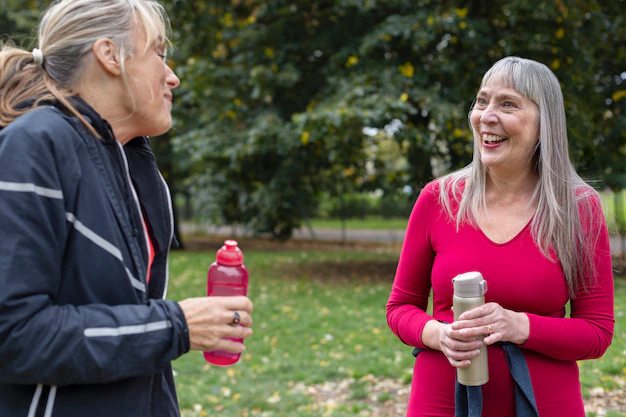Often it is said that females have a very short time span when playing sports at the professional level. Women hit puberty and then have very little time to prove themselves in the sport that they are competing in professionally. The good news is that women who play sports will menopause better than women who don’t play sports but the bad news is that it doesn’t just affect your mood and your hormones but also drags down your performance. Menopause is when the monthly waves of oestrogen and other hormones that women have been surfing since puberty finally ebb for good. Periods cease, of course. But all kinds of other biological processes change as well, including some that affect women and menopause in sports and performance.
Why this change is natural and nothing to worry about?
Women who cross the age of 40, usually are the ones who are nearing their menopausal days but Stacy T. Sims, a nutrition scientist and physiologist at the University of Waikato in New Zealand who has studied women and menopause in sports performance for 25 years has mentioned that even though women hit a certain age, your body does not stop. She adds how the more fit you are the less of a problem the effects of menopause are. Her advice for women nearing or in their menopausal phase is,
“Lift heavy weights-carefully. Do high intensity interval training and plyometrics. Up your protein and do less volume and intensity exercises. Take more time for recovery.”
What can you look out for?
Symptoms of women and menopause in sports and performance may present in younger athletic groups. For example, researchers at the Christchurch Women’s Hospital in New Zealand identified symptoms in 1% of women under the age of 40 and 0.1% of women below 30; therefore, some athletes will experience this during their careers. In addition, women’s peak performance age in the Olympics increased consistently over the years, with many winning medals beyond 30 years old. Therefore, it is imperative for practitioners to support the longevity of the female athlete’s career.
Recommendations and tips moving forward for women and menopause in sports:
For women in sport who are reaching their stage of menopausal there are several training recommendations to follow to support your body with the changes that it is facing.
- Resistance training at this time prevents the onset or worsening of sarcopenia and osteoporosis. This is crucial because menopausal hormonal changes accelerate bone loss in women. To ensure resistance training for menopause, training should include high volume and high load training exhibits which result in better muscle mass and physical performance. In addition, women should include pelvic floor muscle exercises to minimize the effects of menopause.
- Aerobic training is also beneficial during menopause as oestrogen regulates ones heart rate and blood pressure and the increase in blood flow from exercise improves vasomotor symptoms by reducing resting body temperature, delaying the onset of sweating and reducing the frequency of hot flashes.
- Exercising is an effective treatment intervention for all menopause stages and can positively influence musculoskeletal, vasomotor, psychological, cardiovascular, and metabolic symptoms.
- Women who are going through menopause should also make sure they are consuming enough calcium, protein and vitamin D.
- Hydration is key. During and after training, especially in the heat it is imperative to pre-hydrate and stay hydrated throughout the practice sessions with a drink filled with electrolytes which will not only give you energy throughout the game but also help in speeding recovery after.
- During this time in a women’s life, there are several hormonal changes as well as changes in the physical, psychological and overall well-being. Weight gain during this time is normal and starving yourself will not help as hormone changes also elevate levels of stress which increases weight gain especially in the abdominal area. Eating less—especially as an active athlete in menopause—will only drive up your stress hormones and make weight harder to lose and easier to gain. Instead, focus on eating nutritionally-dense, whole foods and eat enough to fuel your workouts and recovery.
Conclusion
Overall it is important to remember that as a female your body is going to go through several changes but that should not stop you from being active and playing the sport you love. Be mindful of your diet and staying hydrated to avoid injuries. Tweak your workouts according to your age and it will do wonders for your body. Women and menopause in sports is only an end of one cycle and the beginning of a newer, healthier one.
References
https://www.washingtonpost.com/graphics/health/aging-athletes/
